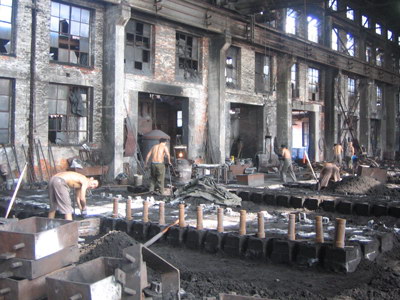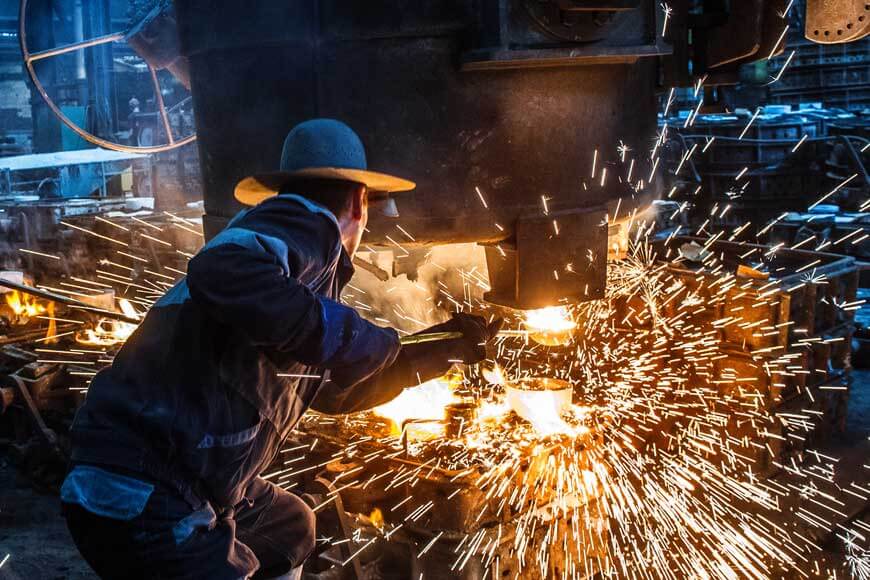Just How a Metal Foundry Contributes to Lasting Metal Manufacturing Practices
Metal foundries play an essential function in advertising sustainability within the metal production sector. By integrating recycled materials, they minimize dependence on virgin resources and lessen environmental effects. Energy-efficient melting procedures further decrease energy intake and discharges. Nonetheless, the trip toward lasting methods includes greater than simply reusing and energy monitoring. It includes a broader commitment to moral sourcing and ingenious innovations. The implications of these methods are significant and warrant more detailed assessment.
The Function of Recycling in Metal Foundries
While metal production has traditionally counted on virgin materials, the enhancing emphasis on sustainability has actually caused a substantial shift in methods, especially in metal foundries. Recycling has emerged as an important component of this change, permitting foundries to repurpose scrap metal and reduce reliance on extracted resources. By incorporating recycled products into their processes, foundries not only decrease environmental impact yet additionally lower manufacturing prices.
The use of recycled metals, such as copper, aluminum, and steel, minimizes power consumption and decreases greenhouse gas emissions related to typical mining and refining techniques. Foundries can accomplish high-quality outputs by using sophisticated sorting and processing technologies to ensure the pureness of recycled materials. This emphasis on recycling fosters a circular economic situation, where waste is lessened, and sources are utilized efficiently. Consequently, metal foundries play a crucial duty in promoting lasting practices within the metal production industry.
Energy-Efficient Melting Strategies
Energy-efficient melting techniques are essential for enhancing sustainability in metal production. These strategies significantly decrease energy consumption during the melting process, which is one of the most energy-intensive phases in metal manufacturing. Technologies such as induction melting, resistance heating, and microwave melting offer improved performance compared to conventional methods. Induction melting, for circumstances, utilizes electromagnetic areas to create warmth straight within the metal, decreasing energy loss and giving precise temperature control.
Additionally, carrying out warm recovery systems can better improve efficiency by catching and reusing waste warm created during melting. Employing innovative insulation products and enhancing heating system styles also add to power savings. By taking on these cutting-edge melting techniques, metal foundries can reduce their carbon footprint, decrease functional costs, and add to a much more sustainable manufacturing landscape. The assimilation of energy-efficient methods not just aligns with ecological goals but likewise fulfills the expanding demand for responsible production methods in the metal market.
Lasting Sourcing of Raw Materials
Sustainable sourcing of basic materials is vital for reducing the environmental influence of metal production. This includes the raised use of recycled metals, the adoption of ethical mining techniques, and efforts aimed at local sourcing. By focusing on these techniques, the industry can promote liable source administration and support regional economies.

Recycled Metal Use
How can industries efficiently decrease their ecological impact while meeting the expanding need for metal? One substantial approach is the utilization of recycled metal. By incorporating scrap metal into their manufacturing procedures, foundries can decrease the removal of virgin materials, consequently saving natural sources and decreasing energy consumption. Recycled steels need less power to procedure contrasted to their raw equivalents, resulting in lower greenhouse gas emissions. Furthermore, using recycled metal assists draw away waste from garbage dumps, promoting a circular economy. Industries that prioritize recycled metal not only add to sustainability yet additionally gain from price financial savings connected with decreased product procurement. Recycled metal use stands as an important strategy for environmentally accountable metal manufacturing.
Moral Mining Practices
While the demand for steels continues to rise, markets are increasingly recognizing the relevance of ethical mining methods in guaranteeing responsible sourcing of raw products. Ethical mining incorporates a commitment to ecological stewardship, social responsibility, and adherence to fair labor practices. Business are now focusing on partnerships with mines that demonstrate openness in their operations, reducing ecological effect and respecting local neighborhoods. This method not only fosters a lasting supply chain however also enhances the online reputation of organizations entailed. By executing strenuous criteria and certifications, industries can deal with unlawful mining tasks and promote the well-being of employees. Ultimately, moral mining techniques add considerably to a much more lasting metal manufacturing community, aligning financial growth with environmental and social stability.
Local Sourcing Campaigns

Advancements in Metal Casting Processes
Advancements in metal casting processes are changing the sector by incorporating innovative recycling techniques that minimize waste. Energy-efficient melting approaches are likewise being created to lower power intake during manufacturing. Additionally, making use of ingenious mold and mildew materials adds to enhanced performance and sustainability in casting operations.
Advanced Recycling Techniques
Advanced recycling methods are transforming metal casting processes, greatly enhancing sustainability in the market. These advancements concentrate on recovering and reprocessing scrap metal, considerably decreasing waste Aluminum Casting and the requirement for virgin products. Techniques such as hydrometallurgy and pyrometallurgy make it possible for foundries to extract important steels from utilized components, ensuring effective source utilization. Additionally, progressed sorting and purification innovations enhance the high quality of recycled metals, making them suitable for high-performance applications. This not only lessens the ecological impact of metal production yet likewise cultivates a round economy by advertising the reuse you can look here of materials. As these recycling methods continue to progress, they guarantee to better improve procedures within foundries and add to a more sustainable metal production landscape.
Energy-Efficient Melting Methods
While conventional melting approaches have long been the foundation of metal casting, current advancements have presented energy-efficient methods that substantially decrease power consumption and exhausts. Technologies such as induction melting and electric arc heating systems have actually acquired prestige, permitting specific control over temperature level and decreasing the requirement for fossil fuels. These approaches not just improve energy efficiency but additionally advertise much faster melting times, which converts to lower operational prices. In addition, developments in warm healing systems allow foundries to record and recycle excess heat generated throughout the melting process. This all natural strategy to energy monitoring not only sustains sustainable methods yet also positions metal foundries as leaders in the change in the direction of greener production procedures, additionally lining up with worldwide sustainability objectives.
Ingenious Mold Materials
As the need for more reliable and sustainable metal casting processes expands, the expedition of innovative mold and mildew products has become a centerpiece in the sector. Conventional mold and mildew products frequently add to ecological difficulties, prompting the search for options that decrease waste and energy consumption. Current advancements consist of the development of biodegradable binders and recyclable compounds, which not only enhance mold efficiency but additionally minimize environmental effect. Additionally, making use of 3D printing modern technology in mold creation permits elaborate layouts that reduce material use and allow quick prototyping. These ingenious materials not only improve casting precision but also align with sustainability goals, showcasing the sector's dedication to decreasing its carbon impact while preserving premium manufacturing requirements.
Minimizing Waste With Advanced Innovation
Cutting-edge modern technologies are transforming the metal production market by next significantly decreasing waste and enhancing efficiency. Advanced data analytics and machine understanding formulas enable foundries to maximize manufacturing processes, recognizing ineffectiveness and decreasing scrap product. Smart sensing units keep track of tools performance in real-time, permitting for predictive upkeep that lowers downtime and waste generation. In addition, additive production strategies, such as 3D printing, permit the development of facility components with marginal product use, significantly decreasing waste compared to conventional techniques.
Closed-loop systems are becoming a lot more widespread, where scrap metal and by-products are reused back into the production cycle, making sure that products are utilized to their greatest capacity. This combination of modern technology not only advertises source preservation however likewise improves the total sustainability of metal production methods. By accepting these developments, foundries can add to an extra lasting future while maintaining competition in the marketplace
The Influence of Foundries on Carbon Impact Decrease
Foundries play a vital duty in decreasing the carbon footprint of the metal production market by implementing various sustainable techniques. By utilizing energy-efficient innovations, such as electrical arc furnaces, these facilities considerably reduced greenhouse gas exhausts compared to standard methods. Additionally, foundries significantly take on renewable resource resources, which also lessens their dependence on fossil fuels.
Recycling scrap metal is one more crucial practice that foundries employ, preserving resources and minimizing the requirement for virgin products. This not only decreases waste yet also reduces down on the energy-intensive extraction procedures connected with mining. The adoption of closed-loop water systems aids to lessen water use and minimize wastewater discharge, contributing to a much more sustainable procedure.
Through these campaigns, foundries demonstrate their commitment to ecological stewardship, bring about a significant reduction in the general carbon footprint of the metal manufacturing field. Their continuous efforts are essential in the change towards a much more lasting commercial landscape.
Regularly Asked Questions
What Kinds of Metals Are Most Typically Recycled in Foundries?
Light weight aluminum, steel, brass, and copper are among one of the most generally recycled metals in foundries. These steels are favored due to their high recycling rates, financial worth, and widespread availability, adding substantially to commercial sustainability efforts.
Just How Do Foundries Ensure the Quality of Recycled Materials?
Foundries identify the high quality of recycled products with rigorous screening, sorting, and filtration procedures. They apply innovative technologies to analyze structure and get rid of impurities, ensuring that the recycled metals satisfy industry requirements for efficiency and safety.
What Accreditations Exist for Sustainable Foundry Practices?
Various certifications exist for lasting foundry practices, including ISO 14001 for ecological monitoring, ISO 50001 for energy management, and LEED accreditation for sustainable building techniques (Aluminum Foundry). These qualifications assist guarantee adherence to environmental and sustainability criteria in operations
How Do Foundries Gauge Their Carbon Footprint Decrease?
Foundries measure carbon footprint decrease via tools like lifecycle evaluations, energy audits, and emissions tracking systems. They contrast standard discharges to existing outputs, examining improvements in power efficiency, product use, and renewable resource adoption gradually.
What Are the Financial Advantages of Sustainable Metal Manufacturing?
Lasting metal manufacturing uses financial advantages such as decreased functional prices, increased efficiency, boosted market competitiveness, and potential federal government motivations. Additionally, it fosters advancement and attracts environmentally conscious consumers, ultimately driving lasting success for services.
Metal foundries play a crucial duty in advertising sustainability within the metal manufacturing market. While metal production has typically relied on virgin materials, the increasing emphasis on sustainability has actually led to a substantial shift in methods, especially in metal foundries. By incorporating scrap metal into their manufacturing processes, foundries can reduce the extraction of virgin materials, thereby conserving all-natural sources and lowering power usage. Foundries play a vital duty in minimizing the carbon footprint of the metal production sector by implementing numerous lasting techniques. Recycling scrap metal is another essential method that foundries utilize, conserving resources and decreasing the requirement for virgin materials.